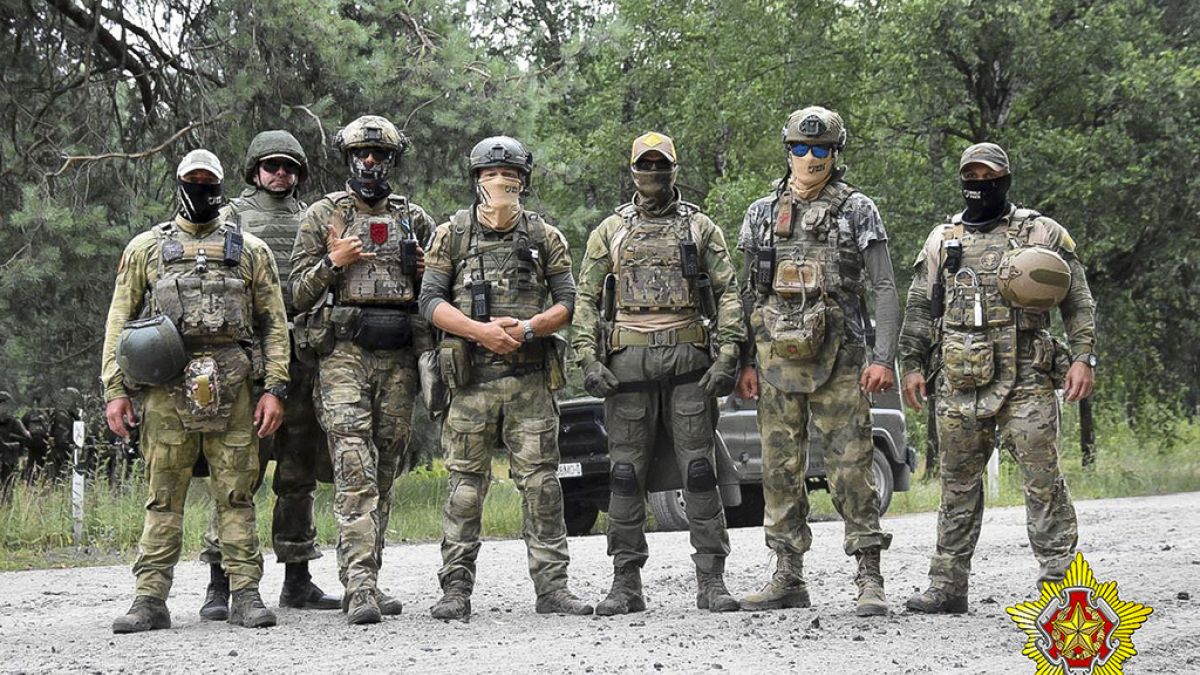Members of the mercenary force reportedly relocated to Belarus after its leader Yevgeny Prigozhin's abortive mutiny in June.
Alexander Lukashenko said on Friday the Russian mercenary group Wagner will remain in Belarus, without specifying their purpose or how long they would stay.
"Wagner is alive and Wagner will live in Belarus", claimed the Belarusian President, saying the force's "hardcore" would remain under a scheme he "built" with its leader.
Wagner boss Yevgeny Prigozhin is believed to have died in a plane crash on Wednesday, amid speculation the Kremlin was behind the incident.
All 10 people on board, including several other senior Wagner figures, apparently died after the private jet crashed north of Moscow.
Lukashenko said he did not believe his Russian counterpart gave the order to kill Prigozhin, though was "not to be able to say" who was responsible.
"I know [Vladimir] Putin," said Lukashenko, quoted by the state news agency Belta. "He's a thoughtful man, very calm... I can't imagine that it was he who did that."
The crash was "too brutal and amateur", continued the Belarusian president, revealing his plans to keep 10,000 mercenaries in Belarus.
Moscow has hit back against claims it ordered the assassination of Prigozhin, who launched a mutiny to bring down a military establishment he saw as incompetent.
"It's an absolute lie," said Kremlin spokesman Dmitry Peskov on Friday, denying allegations from Western officials that Putin orchestrated the incident.
"We must approach this problem based on facts," he added.
Russian authorities have said the cause of the crash is under investigation.
Meanwhile, Putin on Friday signed a decree requiring his troops to take an oath to Russia, as regular army soldiers do.
Under this decree detailed on the government's website, they must swear "fidelity" and "loyalty" to the state and "strictly follow the orders of commanders and superiors".
The Institute for the Study of War argued that Russian authorities likely moved against Prigozhin and his top associates as “the final step to eliminate Wagner as an independent organisation.”
On 24 June, Prigozhin led a short-lived rebellion against the Kremlin, which the Russian leader denounced as “treason” and a “stab in the back”, vowing to avenge it.
The charges against Prigozhin were soon dropped in a secretive deal that exiled the mercenary force to Belarus, with long-term Putin ally Lukashenko acting as a mediator.
On Friday, the British Ministry of Defence said no "definitive proof" currently exists that Prigozhin was killed.
"There is not yet definitive proof that Prigozhin was onboard and he is known to exercise exceptional security measures," it said. "However, it is highly likely that he is indeed dead."
The UK MoD claimed the "demise of Prigozhin would almost certainly have a deeply destabilising effect" on the force, citing his "hyperactivity", "exceptional audacity", "drive for results and extreme brutality".
These are "unlikely to be matched by any successor", it added.
Putin praised the mercenary leader as a "talented man" on Thursday, after remaining silent about what had happened. He expressed his condolences to the families of those apparently aboard the jet and referred to “serious mistakes" by Prigozhin.
It was not clear why several high-ranking members of Wagner, including top leaders who are normally exceedingly careful about their security, were on the same flight. The purpose of their joint trip to St. Petersburg was unknown.
Several Russian social media channels reported the bodies were burned or disfigured beyond recognition and would need to be identified by DNA.
These reports were picked up by independent Russian media, but The Associated Press was not able to independently confirm them.
Speaking to Euronews on Thursday, Dr Stephen Hall, lecturer of Russian politics at the University of Bath, claimed the plane crash was a message.
"Putin sends signals to people," he said. "I think this is quite a clear signal that this is what happens to traitors."
"The war is going badly and some elites are dissatisfied. By killing Prigozhin it sends the signal that if you rise up then you're going to have a very brutal end," Hall continued.
Nationalist and patriotic groups in Russia have become increasingly more vocal about their government's military campaign in Ukraine, often slamming them for mismanagement and botched battlefield manoeuvres.
Numerous opponents and critics of Putin have been killed or gravely sickened in apparent assassination attempts in the past.
"It is no coincidence that the whole world immediately looks at the Kremlin when a disgraced ex-confidant of Putin suddenly falls from the sky, two months after he attempted an uprising,” said German Foreign Minister Annalena Baerbock, while acknowledging that the facts were still unclear.
“We know this pattern … in Putin’s Russia - deaths and dubious suicides, falls from windows that all ultimately remain unexplained,” she added.
Abbas Gallyamov, a former speechwriter for Putin turned political consultant, said by carrying out the mutiny and remaining free, Prigozhin "shoved Putin's face into the dirt in front of the whole world.”
Failing to punish Prigozhin would have offered an “open invitation for all potential rebels and troublemakers,” so Putin had to act, Gallyamov added.
